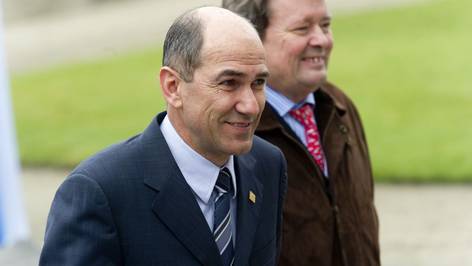NEWS
Prime Minister Janez Janša: "Maximising the stability of the eurozone is in our common interest."
In his statement to the press, the Slovenian Prime Minister, Janez Janša, who arrived tonight in Brussels to attend the meeting of the European Council, declared that the eurozone crisis is under control, but that some countries still have to "take some difficult steps". Unfortunately, Slovenia numbers among them, but he went on to say that "our work will be that much easier if there is less instability in our region".
The Prime Minister stressed that the most important act of the current European Council will be the signing of the Fiscal Compact – that is, the Treaty on Stability, Coordination and Governance in the Economic and Monetary Union. "This is by far the most important single long-term step towards the stabilisation of the situation in the eurozone." He observed that, without this measure, which has already been implemented by many countries that are not members of the eurozone, it would be impossible to solve future crises by mere ad-hoc actions, and that such an approach required the full commitment of all Member States, including Slovenia: "This is why the Slovenian Government yesterday adopted a draft proposal for the amendment of Article 148 of the Slovenian Constitution, in order to be able to implement Article 3 of the Treaty, which states that the national budget must be balanced." The Prime Minister added that he would resume talks next Monday with the presidents of the parties in the National Assembly in order to reach an agreement on the constitutional amendment.
The Prime Minister also underlined another important step to be taken by the current European Council – granting EU candidate status to Serbia. "This is a crucial development, not only for Serbia and the region, but also for the European Union – not least because this sends out a positive signal to those countries that want to become candidates," he explained, expressing his hope that this would hasten the commencement of negotiations with countries, such as Macedonia, that have waited a long time to be granted this status. He also said that he firmly believed that granting Serbia EU candidate status would contribute to a more rapid resolution of the issues between Serbia and Kosovo that remain outstanding.





